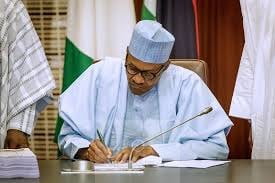 Last night, President Muhammadu Buhari signed the Covid-19 Regulations 2020 in accordance with Sections 2, 3 and 4 of the Quarantine Act (CAP Q2 LFN 2004), has locked down Lagos, Ogun States and the (FCT) Federal Capital Territory.
Last night, President Muhammadu Buhari signed the Covid-19 Regulations 2020 in accordance with Sections 2, 3 and 4 of the Quarantine Act (CAP Q2 LFN 2004), has locked down Lagos, Ogun States and the (FCT) Federal Capital Territory.
The president’s media adviser, Mr. Femi Adesina, made a statement about the regulation, which took effect from March 30, 2020, said this would serve as a legal backing to various measures unveiled by the president during his national broadcast on March 29, 2020.
The regulations declared Covid-19 as a dangerous and infectious disease.
He also added that such measures like the restriction/cessation of movement in Lagos, Ogun State and the (FCT) Federal Capital Territory and, among other decisions are aimed at containing the spread of the pandemic in the country.
“In addition, to measures aimed at enabling Nigerians to perform on-line transactions and use automatic teller machine (ATMs) during these restrictions, the regulations grant exemption to the financial system and money markets.
The financial system exemption, the statement added, was aimed at allowing very skeletal operations with a view to keeping the system in light operations while these regulations subsists.
The statement read: “In exercise of the powers conferred on him by Sections 2, 3 and 4 of the Quarantine Act (CAP Q2 LFN 2004), and all other powers enabling him in that behalf, President Muhammadu Buhari, Monday, signed the Covid-19 Regulations, 2020, which declared Covid-19 a dangerous infectious disease.
“The Regulations, effective March 30, 2020, also gave legal backing to the various measures outlined in the President’s National Broadcast on March 29, 2020, such as Restriction/Cessation of Movement in Lagos, FCT and Ogun States and others toward containing the spread of the pandemic in the country.
“In addition, to ensure that Nigerians can still perform on-line transactions and use ATMs whilst observing these restrictions, an exemption is granted to the financial system and money markets to allow very skeletal operations in order to keep the system in light operations during the pendency of these regulations.”
The president’s directive locking down the two states and the FCT as well as similar directives by state governors restricting entry and movement into and within their states had been criticised as unconstitutional by some lawyers, including Mr. Ebun Olu-Adegboruwa (SAN), who argued that the restrictions were contrary to law.
Mr Olu-Adegboruwa got partial support from the Secretary to the Government of the Federation (SGF), Mr. Boss Mustapha, who said yesterday in Abuja that the directives by state governors outside Lagos and Ogun restricting movements within and outside states were inconsistent with the president’s directive.
Earlier yesterday the Minister of Justice and Attorney-General of the Federation, Mr. Abubakar Malami, had argued that contrary to the position of Olu-Adegboruwa, Buhari’s directives were in order and had the legal and constitutional backing.
Mr. Malami said that Olu-Adegboruwa misconstrued the law by stating that the president could not single-handedly declare a lockdown in the affected states.
The AGF in a statement made available to journalists maintained that by the combined reading of Section 5, 14, 20 and 45 of the 1999 Constitution and Section 2, 6 and 8 of the Quarantine Act and Article 4 of the International Covenant on Civil and Political Rights and Article 11 on Human and Peoples Right makes the declaration by the president valid, legal and enforceable.
While noting that the senior lawyer did not state any constitutional or statutory provision which the president breached in the present circumstances, he stated that the president did not make a declaration of a State of Emergency under Section 305(1) of the 1999 Constitution (as amended) which would have required the concurrence of both chambers of the National Assembly.
He argued: “Even at that Section 305(6) (b) of the 1999 Constitution (as amended) permits a proclamation of a State of Emergency to run for a period of 10 days without the approval of the National Assembly when the parliament is not in session as in the present situation wherein the National Assembly has shut down.
“The learned silk also goofed when he questioned the president’s powers to restrict movement and claiming that such powers can only be exercised by the state governors and the respective state assemblies. It is clear from the president’s broadcast that what his excellency sought to address is a public emergency occasioned by a dangerous and infectious coronavirus disease. The restriction of movement came on the heels of advice received by the president from the Federal Ministry of Health and the NCDC, the two focal agencies in the fight against COVID-19.
“It, therefore, becomes obvious and clear that the restriction order is part of a national quarantine measure.”
He argued further that the president acted rightfully under the powers conferred on him by the Quarantine Act 1990 CAP 384 LFN whose Long Title read thus: “An Act to provide for and regulate the imposition of quarantine and to make other provisions for preventing the introduction into and spread in Nigeria, and the transmission from Nigeria, of dangerous infectious diseases.”












